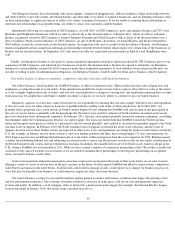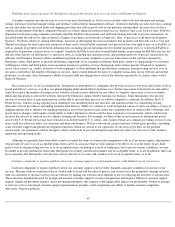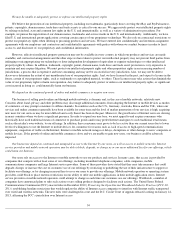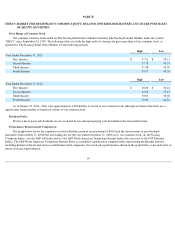eBay 2013 Annual Report Download - page 53
Download and view the complete annual report
Please find page 53 of the 2013 eBay annual report below. You can navigate through the pages in the report by either clicking on the pages listed below, or by using the keyword search tool below to find specific information within the annual report.
We are subject to regulatory activity and antitrust litigation under competition laws.
We are subject to scrutiny by various government agencies under U.S. and foreign regulations, including competition laws. Some
jurisdictions also provide private rights of action for competitors or consumers to assert claims of anti
-
competitive conduct. Other companies and
government agencies have in the past and may in the future allege that our actions violate the antitrust or competition laws of the U.S., individual
states, the European Commission, or other countries, or otherwise constitute unfair competition. Contractual agreements with buyers, sellers, or
other companies could give rise to regulatory action or antitrust litigation. Also, our unilateral business practices could give rise to regulatory
action or antitrust litigation. Some regulators, particularly those outside of the U.S., may perceive our business to have so much market power
that otherwise uncontroversial business practices could be deemed anticompetitive. For example, in the U.S., we have been sued by a plaintiff
representing a putative class of sellers who alleges that we have illegally monopolized a market for online auctions. In Korea, the national
competition authority investigated allegations that we have engaged in illegal exclusive conduct and rendered a decision against us in October
2010. Both the main case and a related administrative action were resolved in our favor. The competition authorities in Germany and Australia
have conducted investigations (now completed) of various actions taken by our businesses. Such claims and investigations, even if without
foundation, typically are very expensive to defend, involve negative publicity and substantial diversion of management time and effort, and
could result in significant judgments against us or require us to change our business practices.
In several jurisdictions, we have taken actions designed to improve the security of transactions and the quality of the user experience on our
websites and mobile platforms. For example, beginning in June 2008, we have required users in the U.K. to offer PayPal as a payment
alternative on most transactions on our localized U.K. site, and since October 2008, we have required sellers on eBay.com to accept one or more
accepted payment methods (currently PayPal, credit or debit cards processed through Internet merchant accounts, ProPay and Skrill (formerly
known as Moneybookers)) and no longer allow any forms of paper payment, including checks and money orders, to be listed by sellers in the
U.S. for most categories of items. While these initiatives are intended to improve and make safer our users' buying experience and/or increase
activity on our sites, certain users may be negatively affected by or react negatively to these changes, and may allege that we have (and are
abusing) market power. We have faced inquiries from government regulators in various jurisdictions related to such actions, such as, in 2008,
both the Australian Competition and Consumer Commission and the Reserve Bank of Australia reviewed our policies requiring sellers to offer
PayPal as a payment alternative on most transactions on our localized Australian website and precluding sellers from imposing a surcharge or
any other fee for accepting PayPal or other payment methods. We may face similar inquiries from other government regulators in the future.
Negative reactions to these changes by our users or government authorities could, among other things, force us to change our operating practices
in ways that could harm our business, operating results and profitability.
Our business may be adversely affected by factors that cause our users to spend less time on our websites or mobile platforms and
applications, including geopolitical events, natural disasters, seasonal factors and increased usage of other websites.
Our users may spend less time on our websites or mobile platforms and applications as a result of a variety of diversions, including:
Anything that diverts our users from their customary level of usage of our websites, mobile platforms or applications could adversely affect
our business.
51
•
geopolitical events, such as war, the threat of war, or terrorist activity;
•
natural disasters, such as hurricanes or earthquakes;
• increased use of social networking or other entertainment websites or mobile platforms and applications, which may decrease the
amount of time users spend on our websites or mobile platforms and applications and
• seasonal fluctuations due to a variety of factors, such as decreased activity on our websites caused by the onset of good weather
during the summer months and national holidays or increased activity during the holiday season.
























